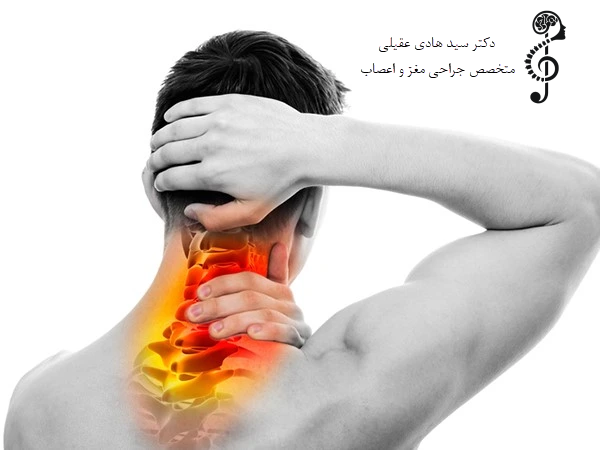The most common signs of cervical disc are collected in this article.
It is one of the common problems of the spine that can occur due to damage, pressure or wear of the intervertebral discs of the neck. This problem can appear gradually or suddenly and affect a person’s daily life. In the following, we will review the common symptoms of cervical disc, aggravating factors, and treatment and prevention methods.
Cervical disc symptoms
- Neck pain: The most common symptom of a cervical disc is constant or temporary pain in the neck area. This pain may spread to the shoulders, arms, and even hands. The intensity of the pain can vary from mild to severe and may be aggravated by neck movements.
- Stiffness and stiffness of the neck: People with cervical disc disease usually feel stiffness and stiffness in the neck, which makes it difficult to move the neck. This problem is usually worse in the morning and decreases with daily activities.
- Tingling and numbness: Another symptom of a cervical disc is tingling or numbness in the arms, hands, or fingers. This symptom is caused by the pressure on the cervical nerves caused by the displacement of the disc.
- Muscle weakness: Weakness in the muscles of the arms and hands, which can lead to a decrease in the strength and function of these muscles, is another symptom of cervical disc. In severe cases, the person may not be able to perform daily tasks.
- Headache: Headaches that start in the neck and spread to other parts of the head can also be a sign of a cervical disc. These headaches are usually accompanied by neck pain and stiffness.
- Decreased range of motion: Decreased range of motion of the neck, which makes it difficult to perform daily activities, is also a symptom of cervical disc. The person may have trouble turning or bending their neck.
Aggravating factors of cervical disc
- Improper sitting: Improper sitting posture, especially when working at a computer, can put more pressure on the cervical discs. Prolonged use of the computer without regular breaks can lead to exacerbation of cervical disc symptoms.
- Repetitive movements: Performing repetitive neck movements, such as using a cell phone a lot or lifting heavy objects, can damage the cervical discs and aggravate symptoms.
- Sports injuries: Injuries from contact sports or sports that require vigorous neck movements can aggravate a cervical disc. Sports such as football, wrestling and weightlifting are among the high-risk sports for cervical disc.
- Stress and tension: Stress and tension can lead to increased stiffness and pain in the neck area. Anxious and stressed people are usually more at risk of cervical disc.
To know the most common symptoms of the lumbar disc, refer to the link below.
click here
Treatment and prevention of cervical disc
- Exercise and physical therapy: Regular exercises and physical therapy programs can help improve the condition of the cervical disc. Strengthening and stretching exercises for the neck, performing light aerobic exercises such as walking and swimming can help reduce the symptoms of cervical disc.
- Painkillers and anti-inflammatory drugs: The use of painkillers and anti-inflammatory drugs is effective in reducing pain and inflammation caused by cervical disc. These drugs should be taken under the supervision of a doctor.
- Surgical procedures: In more severe cases, surgery may be needed to remove or repair the damaged disc. Surgery is usually used as a last resort and recommended after other treatments have failed.
- Lifestyle changes: Making lifestyle changes such as using the right pillow and mattress, avoiding lifting heavy objects and maintaining proper body posture can help prevent cervical disc.
- Stress management: Stress management through relaxation techniques such as yoga, meditation and breathing exercises can help reduce tension and neck pain.
You can use the following sources to get more information about the most common symptoms of cervical disc.
Mayo Clinic
- Complete explanation on the symptoms, causes and treatment of cervical disc
- Link to cervical disc article on Mayo Clinic website
WebMD website
- Providing expert information about cervical disc symptoms, diagnosis and treatment methods
- Link to cervical disc article on WebMD


